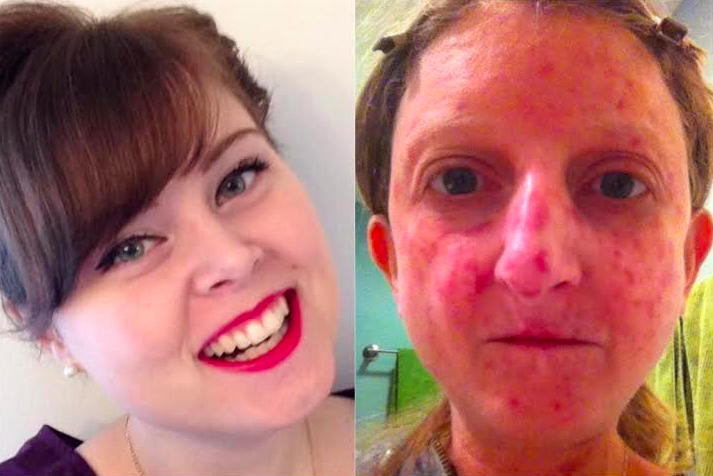When Facebook Said Her Face Would Receive 'High Negative Feedback'
It’d been years since Lisa Goodman-Helfand publicly shared a photograph of her bare face.
Goodman-Helfand, 40, lives with scleroderma, an autoimmune disease that can cause skin disfiguration. As a result, her skin is covered in red blotches. She always took care to conceal how her disease affected her looks — until she connected with Chanel White, another woman living with scleroderma. On July 22, Goodman-Helfand shared the photo below of her and White side by side in an article on her blog. She wanted to show others the variety of ways scleroderma manifests itself, and inspire people to broaden how they define beauty.

When the post received positive feedback, Goodman-Helfand decided to take her message further by placing an ad on Facebook to promote the article. However, she received a reply from Facebook explaining her ad was not approved:
Your ad wasn’t approved because it includes ‘before and after’ images, or other images showing unexpected or unlikely results. It’s also recommended that you avoid focusing on specific body parts, because these images typically receive high negative feedback.
Goodman-Helfand responded, explaining that her photo was not a “before and after” image and asking if someone could please take another look at the article and explain why the ad wasn’t approved. A Facebook representative responded saying she’d looked at the ads and determined they “weren’t able to accept them because of the image used,” according to Goodman-Helfand.
“I can’t describe the emotional blow that accompanied Facebook’s rejection of my ad,” Goodman-Helfand wrote in a blog post about the experience. “I’ve been advised to ‘avoid focusing on specific body parts, because these images typically receive high negative feedback.’ That said body part is my face. Does anyone else see the irony in my face violating Facebook’s ad policy? Would my scleroderma ravaged elbows, or fingers have been less offensive?”
At this point, Goodman-Helfand, though devastated, made the decision to move on from the issue and not to let Facebook’s ad team determine her sense of self-worth. But when her story appeared on Yahoo Canada on July 29, Facebook contacted her again, saying a mistake had been made and giving her instructions on how to reactivate the ads. The message read:
Thanks for reaching out to our team. It appears your ads were mistakenly disapproved, and we’ve re-reviewed and approved them. I’m sorry for any inconvenience this caused.
“While I appreciate the outcome, I’m confident things would not have played out this way without Yahoo intervening,” Goodman-Helfand told The Mighty in an email. “I’m grateful that Yahoo noticed my story and pursued the issue with Facebook.”
However, even after Goodman-Helfand’s photo was cleared to run as an ad, she again received a rejection note from Facebook when she tried to place the same photo in an ad for the Yahoo article on July 29. She wrote back to Facebook asking why the photo was rejected once again, but says at this point, it’s not about the rejection anymore.
“It’s about why it was rejected in the first place,” she told The Mighty. “Facebook reconsidering and allowing me to the run the ad is a BandAid for a massive societal issue that deserves attention. I’m lucky that I can put on makeup and live my life. What about the people for whom that is not an option?”
Read Goodman-Helfand’s original post about having her ad rejected by Facebook here.
Related: What You May Be Missing When You Compare These 2 Faces
